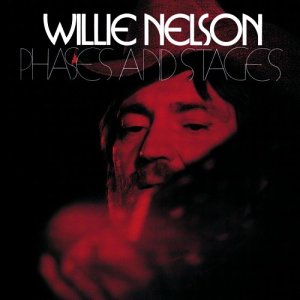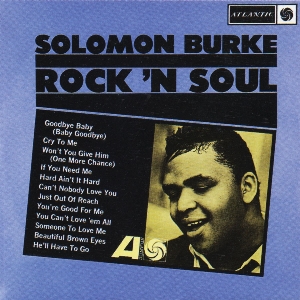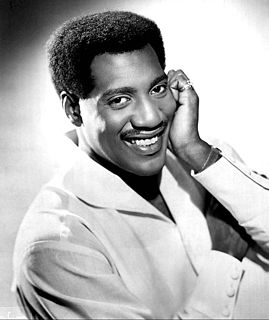Background
When Burke arrived for his first recording session at the Atlantic Records studio at 1841 Broadway in New York City on December 13, 1960, [1] he was given four songs, including his first Atlantic release, "Keep the Magic Working", which was a flop [2] and "Just Out Of Reach (Of My Two Empty Arms)", [3] a cover of a country song written and recorded by Virgil "Pappy" Stewart, [4] [5] that had been a minor hit for Faron Young in 1953 (#10 C&W), [6] and later for Patsy Cline.
Burke figured this did not portend a long future with Wexler and Atlantic: "Here’s the greatest R&B label in the world, and they give me country songs to sing. What are they trying to tell me?." [3] In 2005 Burke recalled: "I started out as a cowboy on Atlantic Records – without a horse! I was the only singing cowboy with a corned-beef-and-pastrami sandwich on white with mayonnaise." [7] Despite his reservations, Burke, "accompanied by smooth backing vocals and an arrangement equal parts Nashville and Nat King Cole, gave it his best." [3] Burke: "I like country music but I don't think it was deliberate. I think it was something we just accidentally happened onto. By my being versatile. By my being able to sing different songs – being able to change my tone quality, having the different octaves. You must remember, I was capable of singing anything." Burke recalled: "They weren’t happy with my rendition, because I felt I had to talk. We did it several times and I kept talking on the record. Mr. Wexler said 'I don’t think that’s gonna work'. At that time Mr. Paul Ackerman and others said 'leave it in. We don’t know what we’re doing anyway. This is something new we’re trying. No black artist has ever done country music before, so let’s see what’s gonna happen'. That was the turning point of my career – after that, international artist worldwide." When recalling Burke's first recording session at Atlantic, Wexler added in 2002: "There was a blizzard the morning we were to do the first recording session with Solomon and I didn't know if I would be able to get into New York. The trains weren't running, but I made it in that morning and there was Solomon, who had come up from Philadelphia. We did four songs in three hours, including 'Just Out of Reach'. After we finished recording, I went into the control room to listen to the playback. I looked around for Solomon, but he was heading out the door. He said he had to get back to Philadelphia while it was still light because he had a job shoveling snow. I think he was getting paid $3.50 an hour. He already had something like eight kids." [8] According to Tony Cummings, "Despite the use of a different arranger at each session Solomon conquered all. His rich, vibrant, baritone voice brought the full majesty of the gospel tradition to a series of intense, moody ballads and laid down the solid groundwork of the soon-to-follow soul music explosion. [9]
Release and reaction
Released in August 1961, [10] after the earlier uncharted release of "Keep the Magic Working" b/w "How Many Times?" (Atlantic 2089), [1] "Just Out of Reach (Of My Two Open Arms)" (Atlantic 2114) was Burke's first hit, selling over a million copies, [11] and subsequently spent 19 weeks on the R&B charts while climbing to No. 7, as well as crossing over into the pop top 40, reaching No. 24 on November 20, 1961. [12] [13]
Concert promoters in Mississippi, South Carolina, and Alabama, who were unaware that Burke was an African American, accidentally booked him to sing at Ku Klux Klan picnics and rallies, with up to 30,000 hooded Klansmen in attendance. [14] [15] [16] In a 2002 interview Burke recalled: "Way down in the South somewhere, I showed up and the promoter said to me, "Is Solomon Burke here yet?" I said, "Yeah, I'm right here." His eyes grow wide and he walks away. The guy comes back with the sheriff and he says, "Boy, don't play games. Show me some I.D." So he looks at it and pulls the promoter aside and says, "You got a problem. You can't let him go out there." So they called the doctor and had him cover my face in bandages and made it look like I had an accident. That's how I performed that night." [14] [17]

Atlantic Recording Corporation is an American record label founded in October 1947 by Ahmet Ertegun and Herb Abramson. Over its first 20 years of operation, Atlantic earned a reputation as one of the most important American labels, specializing in jazz, R&B, and soul by Aretha Franklin, Ray Charles, Wilson Pickett, Sam and Dave, Ruth Brown and Otis Redding. Its position was greatly improved by its distribution deal with Stax. In 1967, Atlantic became a wholly owned subsidiary of Warner Bros.-Seven Arts, now the Warner Music Group, and expanded into rock and pop music with releases by Crosby, Stills, Nash & Young, Led Zeppelin, and Yes.

Solomon Vincent McDonald Burke was an American singer who shaped the sound of rhythm and blues as one of the founding fathers of soul music in the 1960s. He has been called "a key transitional figure bridging R&B and soul", and was known for his "prodigious output".

Wilson Pickett was an American singer and songwriter.

Sam & Dave were an American soul and R&B duo who performed together from 1961 until 1981. The tenor (higher) voice was Sam Moore and the baritone/tenor (lower) voice was Dave Prater (1937–1988).
Bertrand Russell Berns, also known as Bert Russell and (occasionally) Russell Byrd, was an American songwriter and record producer of the 1960s. His songwriting credits include "Twist and Shout", "Piece of My Heart", "Here Comes the Night", "Hang on Sloopy", "Cry to Me" and "Everybody Needs Somebody to Love", and his productions include "Baby, Please Don't Go", "Brown Eyed Girl" and "Under the Boardwalk".
Stax Records is an American record company, originally based in Memphis, Tennessee. Founded in 1957 as Satellite Records, the label changed its name to Stax Records in 1961. It also shared its operations with sister label Volt Records.

"In the Midnight Hour" is a song originally performed by Wilson Pickett in 1965 and released on his 1965 album of the same name, also appearing on the 1966 album The Exciting Wilson Pickett. The song was composed by Pickett and Steve Cropper at the historic Lorraine Motel in Memphis, later the site of the assassination of Martin Luther King Jr. Pickett's first hit on Atlantic Records, it reached number one on the R&B charts and peaked at number 21 on the pop charts.

Edward Lee Floyd is an American R&B and soul singer and songwriter, best known for his work on the Stax record label in the 1960s and 1970s, including the No. 1 R&B hit song "Knock on Wood".
Donald James Randolph, better known by the stage name Don Covay, was an American R&B, rock and roll, and soul singer-songwriter most active from the 1950s to the 1970s.

"Proud Mary" is a song written by John Fogerty and first recorded by his band Creedence Clearwater Revival. It was released by Fantasy Records as a single from the band's second studio album, Bayou Country, which was issued by the same record company and is generally considered to have been released in early January 1969, although one source states that it came out just before Christmas 1968. The song became a major hit in the United States, peaking at No. 2 on the Billboard Hot 100 in March 1969, the first of five singles to peak at No. 2 for the group.

Phases and Stages is the 17th studio album by Willie Nelson, which followed the moderate success of his first Atlantic Records release, Shotgun Willie. Nelson met producer Jerry Wexler at a party where Nelson sang songs from an album he planned to record. The single "Phases and Stages" was originally recorded the same year. Nelson recorded the album at Muscle Shoals Sound Studios in two days and Wexler produced it.
"I Never Loved a Man " is a 1967 single released by American soul singer Aretha Franklin. Released on Atlantic Records, as the first big hit of her career, it became a defining song for Franklin, peaking at number one on the rhythm and blues charts and number nine on the pop charts. The B-side was "Do Right Woman, Do Right Man". Before this Franklin had placed only two Top 40 singles on the pop chart during her modest tenure with Columbia Records.
"Everybody Needs Somebody to Love" is a song written by Bert Berns, Solomon Burke and Jerry Wexler, and originally recorded by Solomon Burke under the production of Bert Berns at Atlantic Records in 1964. Burke's version charted in 1964, but missed the US top 40, peaking at number 58.
"Since I Met You Baby" is an American rhythm and blues song written and recorded by pianist Ivory Joe Hunter. The song, which Hunter recorded in 1956, became an American standard, and saw renewed popularity in 1969 when country music artist Sonny James released his hit version.

"Cry to Me" is a song written by Bert Berns and first recorded by American soul singer Solomon Burke in 1961. Released in 1962, it was Burke's second single to appear in both Billboard magazine's Hot R&B Sides and Hot 100 singles charts. Several other artists recorded the song, including Betty Harris (1963), the Pretty Things (1965), the Rolling Stones (1965), Freddie Scott (1967) and others.

Rock 'N Soul is a 1964 studio album by Grammy Award winning musician Solomon Burke. The album contained seven top 100 hits. Originally released on LP on Atlantic Records, #8096, in July 1964, it was subsequently reissued in March, 1997, on the Sequel Records imprint, #RSACD 861. The album was also reissued in 1998 on the Collectables Records label in conjunction with a June, 1963, Burke album as If You Need Me/Rock 'n' Soul.
"Got to Get You Off My Mind" is a 1965 soul single written and performed by Solomon Burke. The single was produced by Jerry Wexler, and was the most successful of Burke's long career, becoming his highest-charting single on both the R&B and pop singles charts. "Got to Get You Off My Mind" was number one on Billboard's R&B Singles chart for three weeks and made the Top 40 on the pop singles chart.

Otis Ray Redding Jr. was an American singer and songwriter. He is considered one of the greatest singers in the history of American popular music and a seminal artist in soul music and rhythm and blues. Nicknamed the "King of Soul", Redding's style of singing gained inspiration from the gospel music that preceded the genre. His singing style influenced many other soul artists of the 1960s.
The following list is the discography of the American soul musician Solomon Burke.
"If You Need Me" is a 1963 song co-written and originally recorded by Wilson Pickett. It was made into a bigger hit by Solomon Burke, who sent the song to #2 on the R&B charts that year.










